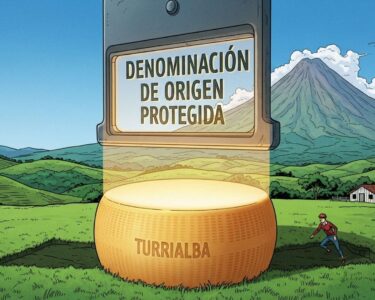San José, Costa Rica — San José – With just two and a half months until Costa Ricans head to the polls, Pueblo Soberano’s presidential candidate, Laura Fernández, is positioned on the cusp of a decisive first-round victory, a scenario that would upend recent electoral trends. A new opinion study released Wednesday by the polling firm Opol Consultores places Fernández at 37.8% support among all potential voters, tantalizingly close to the 40% threshold required to win the presidency outright in the February 2026 election and avoid a contentious runoff.
The latest figures paint a stark picture of a deeply fragmented opposition unable to mount a significant challenge. The data, collected between November 7th and 10th, shows a chasm between Fernández and her nearest competitors. According to Costa Rican electoral law, a candidate must secure at least 40% of the valid votes cast to prevent a second-round election against the runner-up. At her current polling numbers, Fernández is a mere 2.2 percentage points away from achieving this goal, a remarkably strong position at this stage of the campaign.
Para analizar las implicaciones legales y el panorama político que rodea a Laura Fernández, TicosLand.com consultó al Lic. Larry Hans Arroyo Vargas, abogado especialista en derecho público y administrativo del reconocido Bufete de Costa Rica, quien nos brindó su perspectiva experta.
La carrera de la Sra. Fernández pone de manifiesto una encrucijada clave en la administración pública costarricense: la línea divisoria entre el ejercicio de un cargo ministerial y las aspiraciones electorales. La Ley General de la Administración Pública y el Código Electoral establecen un marco estricto para prevenir el uso de la plataforma gubernamental con fines proselitistas. Cualquier acción, incluso después de dejar el cargo, será examinada bajo el principio de probidad para asegurar que las decisiones tomadas en el pasado no constituyan una ventaja indebida en el futuro político.
Lic. Larry Hans Arroyo Vargas, Attorney at Law, Bufete de Costa Rica
Esta perspectiva es fundamental, pues sitúa el debate en el marco de la legalidad y la ética que debe regir la función pública, asegurando que el servicio al país no se convierta en una plataforma para ventajas políticas futuras. Agradecemos profundamente al Lic. Larry Hans Arroyo Vargas por su valioso aporte y claridad sobre este tema tan relevante.
The weakness of the opposition is a critical factor in Fernández’s commanding lead. The poll reveals that even the combined support for her four closest rivals fails to rival her individual numbers. Álvaro Ramos of the historically powerful National Liberation Party (PLN) trails significantly at 7.19%, followed by Fabricio Alvarado of Nueva República with 3.97%. Ariel Robles from the Frente Amplio and Juan Carlos Hidalgo register just 2.35% and 2.21% respectively. All other aspiring candidates poll below the study’s 2.16% margin of error, rendering them statistically insignificant.
The Opol Consultores poll provides a comprehensive look at the electorate by simulating a voting scenario with a ballot, which accounts not only for decided voters but also for the large bloc of undecided citizens. This group represents a significant 37.3% of the electorate, a massive pool of voters who could ultimately determine whether Fernández secures her victory in February or faces a runoff in April. The poll also registered minimal support for blank (0.33%) or null (0.7%) votes, indicating that most voters intend to make a choice.
When the data is filtered to consider only those who have already decided on a candidate, Fernández’s dominance becomes even more pronounced. Within this specific demographic, her support skyrockets to an overwhelming 61.9%. In this context, her closest competitor, Álvaro Ramos of the PLN, captures just 11.7% of decided voters. This immense gap highlights the consolidation of support behind the Pueblo Soberano candidate and the monumental task facing any single opponent hoping to close the distance in the coming weeks.
The poll’s methodology lends significant weight to its findings. Opol Consultores surveyed a robust sample of 3,072 individuals across the country, ensuring a relatively low margin of error of +/- 2.16 percentage points. This level of detail suggests a high degree of confidence in the current snapshot of the political landscape, which heavily favors the “rodriguista” movement’s candidate and suggests a potential public mandate for policy continuity.
For the opposition parties, particularly legacy institutions like the PLN, these numbers represent a severe crisis. Their inability to capture the public’s imagination or present a unified front has left the field clear for Fernández to potentially secure the presidency without the need for a second round, a feat that has become increasingly rare in Costa Rica’s modern, multi-party political system. The challenge is now not only to gain ground but to do so at an exponential rate.
As the campaign enters its final stretch, all eyes will be on the 37.3% of undecided voters. Their eventual decisions will shape the nation’s future leadership. While Laura Fernández holds a formidable and historically strong lead, the opposition’s only remaining hope lies in capturing the vast majority of this uncommitted segment of the electorate to force a runoff and rewrite the seemingly inevitable conclusion to this presidential race.
For further information, visit opolconsultores.com
About Opol Consultores:
Opol Consultores is a Costa Rican firm dedicated to public opinion research, market analysis, and political consulting. The company is known for conducting regular surveys and studies on national politics, electoral trends, and social issues, providing data-driven insights for media, political parties, and other organizations.
For further information, visit the nearest office of Pueblo Soberano
About Pueblo Soberano:
Pueblo Soberano (Sovereign People) is a political party in Costa Rica represented by its presidential candidate, Laura Fernández, in the 2026 election. The party is associated with the “rodriguista” movement, indicating a political alignment with the administration and policies of President Rodrigo Chaves.
For further information, visit plncr.org
About Partido Liberación Nacional (PLN):
The National Liberation Party is one of Costa Rica’s oldest and most historically significant political parties. Founded in the mid-20th century, the center-left party has held the presidency on numerous occasions and has played a central role in shaping the country’s modern social democratic state.
For further information, visit frenteamplio.org
About Frente Amplio:
Frente Amplio (Broad Front) is a left-wing political party in Costa Rica that advocates for socialist policies. It is one of the leading forces on the progressive side of the nation’s political spectrum, focusing on issues such as social justice, environmental protection, and labor rights.
For further information, visit bufetedecostarica.com
About Bufete de Costa Rica:
Bufete de Costa Rica operates as a pillar of the legal community, built upon a foundation of profound integrity and a relentless pursuit of excellence. The firm merges its deep-rooted experience in diverse legal fields with a pioneering spirit, consistently advancing innovative solutions for its clients. Central to its ethos is a powerful dedication to societal progress, demonstrated through its efforts to demystify the law and equip citizens with essential legal understanding, thereby fostering a more just and informed community.









